Organizational Communication: Principles and Practices Report
VerifiedAdded on 2023/01/10
|10
|1930
|87
Report
AI Summary
This report delves into the multifaceted realm of organizational communication, elucidating its various forms such as formal, informal, downward, and upward communication, and their significance in diverse organizational contexts. It underscores the critical role of effective communication in fostering strong relationships, removing misunderstandings, and facilitating the achievement of organizational objectives. The report identifies key principles of effective communication, including clarity, completeness, correctness, credibility, and attention, and highlights their practical application in enhancing communication practices. Furthermore, it provides actionable recommendations, such as the adoption of relatable content, the use of key points, timely responses, and an understanding of human behavior, to cultivate a more effective and efficient communication environment within organizations. The report draws upon several scholarly sources to support its arguments and conclusions.

Individual Report
1
1
Paraphrase This Document
Need a fresh take? Get an instant paraphrase of this document with our AI Paraphraser
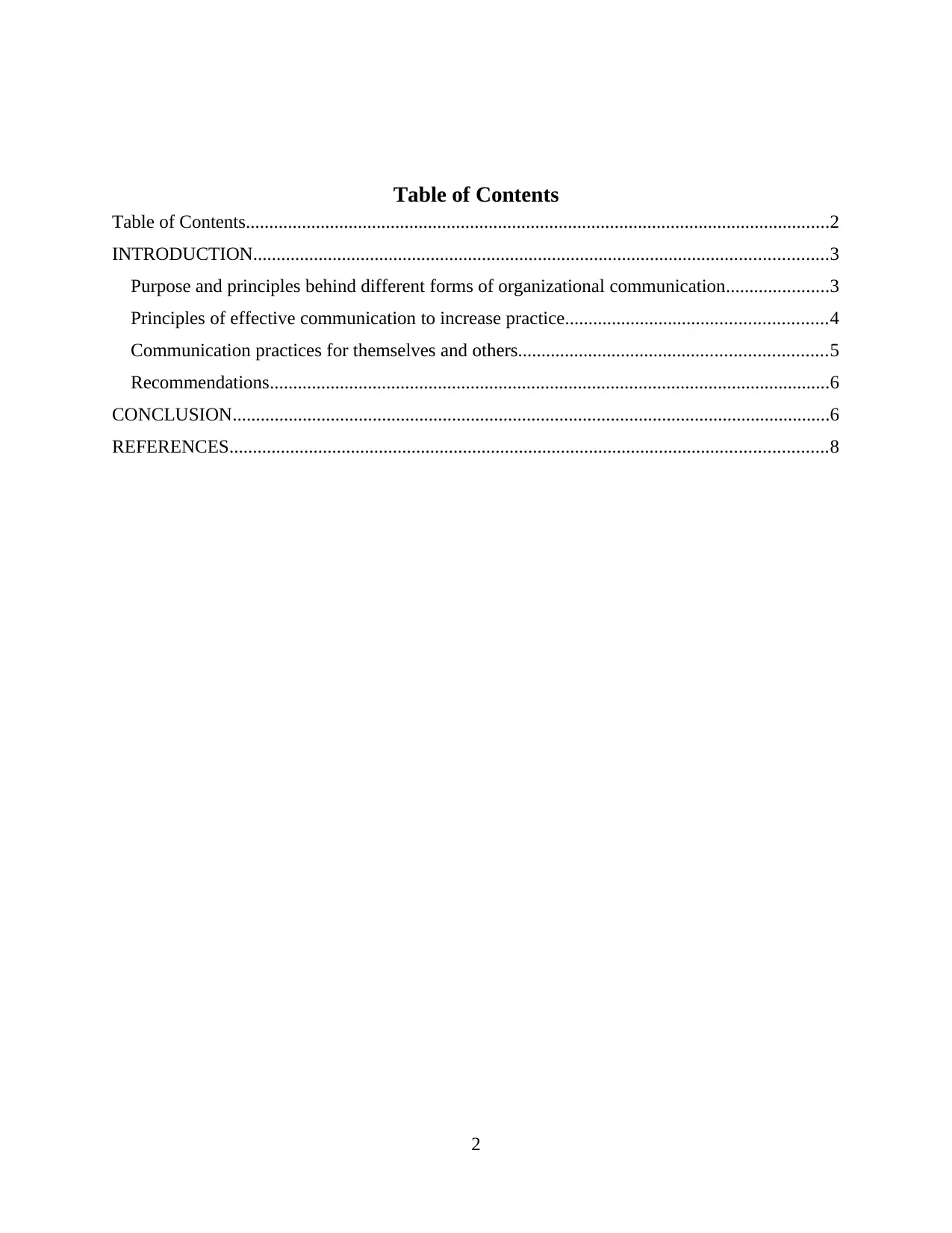
Table of Contents
Table of Contents.............................................................................................................................2
INTRODUCTION...........................................................................................................................3
Purpose and principles behind different forms of organizational communication......................3
Principles of effective communication to increase practice........................................................4
Communication practices for themselves and others..................................................................5
Recommendations........................................................................................................................6
CONCLUSION................................................................................................................................6
REFERENCES................................................................................................................................8
2
Table of Contents.............................................................................................................................2
INTRODUCTION...........................................................................................................................3
Purpose and principles behind different forms of organizational communication......................3
Principles of effective communication to increase practice........................................................4
Communication practices for themselves and others..................................................................5
Recommendations........................................................................................................................6
CONCLUSION................................................................................................................................6
REFERENCES................................................................................................................................8
2
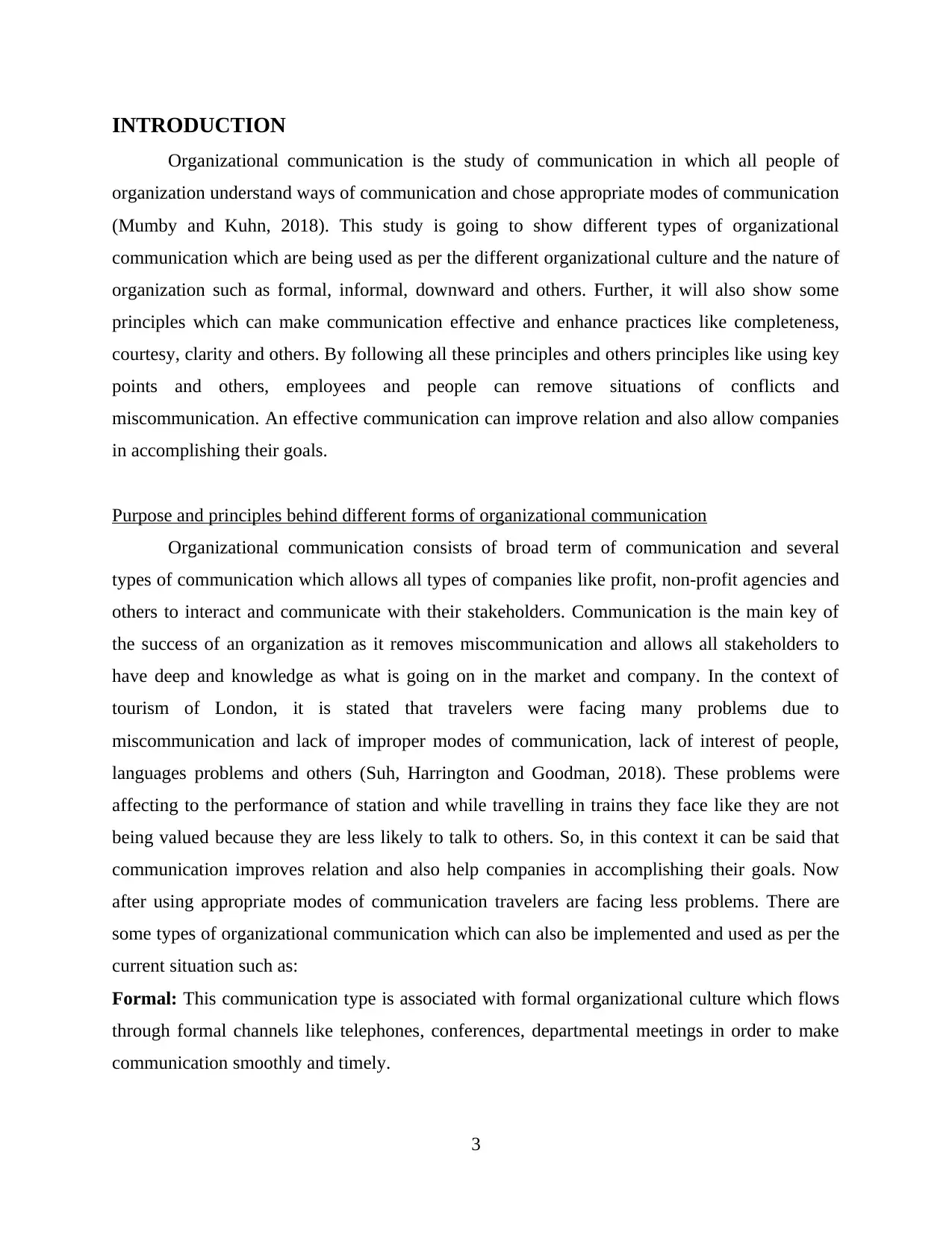
INTRODUCTION
Organizational communication is the study of communication in which all people of
organization understand ways of communication and chose appropriate modes of communication
(Mumby and Kuhn, 2018). This study is going to show different types of organizational
communication which are being used as per the different organizational culture and the nature of
organization such as formal, informal, downward and others. Further, it will also show some
principles which can make communication effective and enhance practices like completeness,
courtesy, clarity and others. By following all these principles and others principles like using key
points and others, employees and people can remove situations of conflicts and
miscommunication. An effective communication can improve relation and also allow companies
in accomplishing their goals.
Purpose and principles behind different forms of organizational communication
Organizational communication consists of broad term of communication and several
types of communication which allows all types of companies like profit, non-profit agencies and
others to interact and communicate with their stakeholders. Communication is the main key of
the success of an organization as it removes miscommunication and allows all stakeholders to
have deep and knowledge as what is going on in the market and company. In the context of
tourism of London, it is stated that travelers were facing many problems due to
miscommunication and lack of improper modes of communication, lack of interest of people,
languages problems and others (Suh, Harrington and Goodman, 2018). These problems were
affecting to the performance of station and while travelling in trains they face like they are not
being valued because they are less likely to talk to others. So, in this context it can be said that
communication improves relation and also help companies in accomplishing their goals. Now
after using appropriate modes of communication travelers are facing less problems. There are
some types of organizational communication which can also be implemented and used as per the
current situation such as:
Formal: This communication type is associated with formal organizational culture which flows
through formal channels like telephones, conferences, departmental meetings in order to make
communication smoothly and timely.
3
Organizational communication is the study of communication in which all people of
organization understand ways of communication and chose appropriate modes of communication
(Mumby and Kuhn, 2018). This study is going to show different types of organizational
communication which are being used as per the different organizational culture and the nature of
organization such as formal, informal, downward and others. Further, it will also show some
principles which can make communication effective and enhance practices like completeness,
courtesy, clarity and others. By following all these principles and others principles like using key
points and others, employees and people can remove situations of conflicts and
miscommunication. An effective communication can improve relation and also allow companies
in accomplishing their goals.
Purpose and principles behind different forms of organizational communication
Organizational communication consists of broad term of communication and several
types of communication which allows all types of companies like profit, non-profit agencies and
others to interact and communicate with their stakeholders. Communication is the main key of
the success of an organization as it removes miscommunication and allows all stakeholders to
have deep and knowledge as what is going on in the market and company. In the context of
tourism of London, it is stated that travelers were facing many problems due to
miscommunication and lack of improper modes of communication, lack of interest of people,
languages problems and others (Suh, Harrington and Goodman, 2018). These problems were
affecting to the performance of station and while travelling in trains they face like they are not
being valued because they are less likely to talk to others. So, in this context it can be said that
communication improves relation and also help companies in accomplishing their goals. Now
after using appropriate modes of communication travelers are facing less problems. There are
some types of organizational communication which can also be implemented and used as per the
current situation such as:
Formal: This communication type is associated with formal organizational culture which flows
through formal channels like telephones, conferences, departmental meetings in order to make
communication smoothly and timely.
3
⊘ This is a preview!⊘
Do you want full access?
Subscribe today to unlock all pages.

Trusted by 1+ million students worldwide
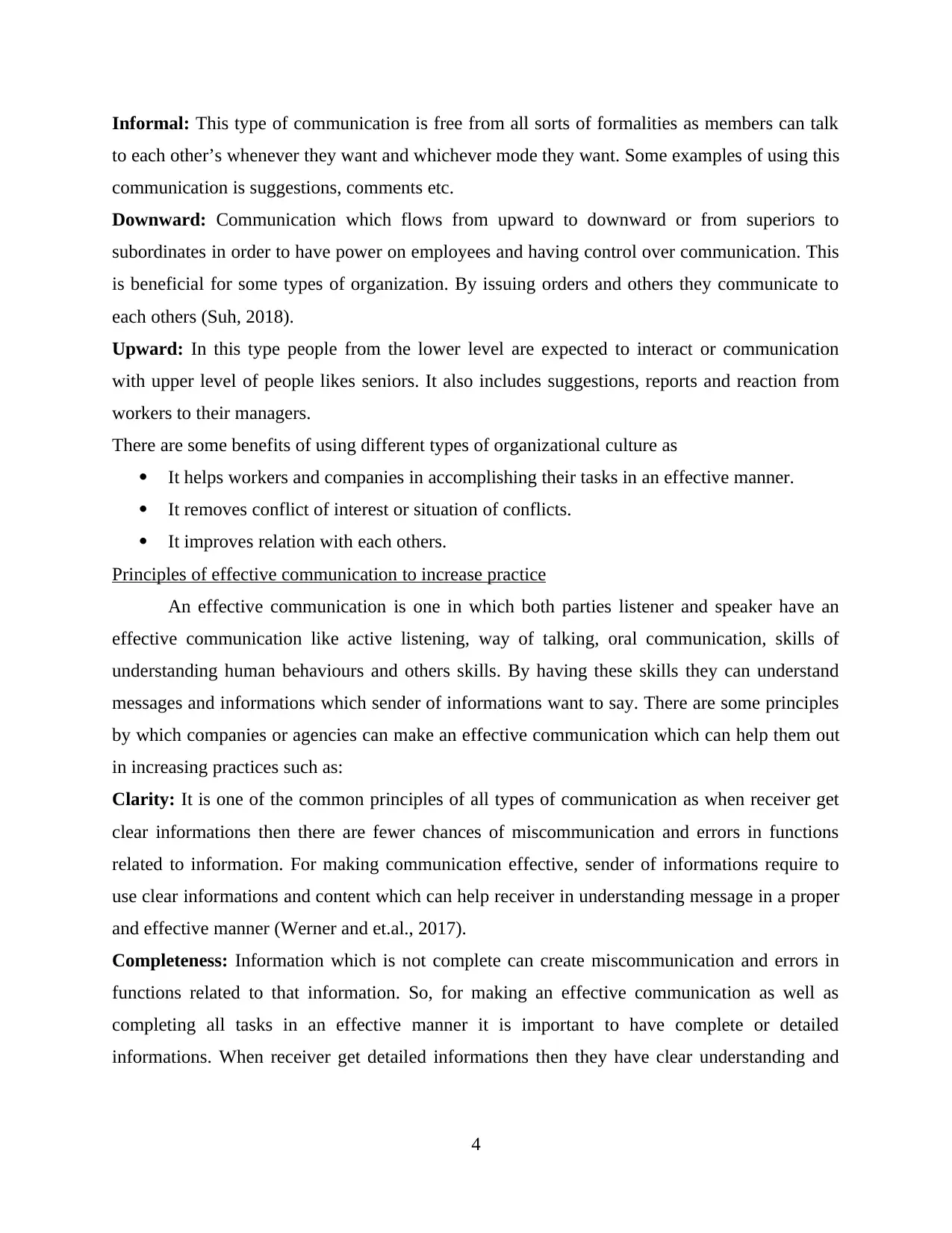
Informal: This type of communication is free from all sorts of formalities as members can talk
to each other’s whenever they want and whichever mode they want. Some examples of using this
communication is suggestions, comments etc.
Downward: Communication which flows from upward to downward or from superiors to
subordinates in order to have power on employees and having control over communication. This
is beneficial for some types of organization. By issuing orders and others they communicate to
each others (Suh, 2018).
Upward: In this type people from the lower level are expected to interact or communication
with upper level of people likes seniors. It also includes suggestions, reports and reaction from
workers to their managers.
There are some benefits of using different types of organizational culture as
It helps workers and companies in accomplishing their tasks in an effective manner.
It removes conflict of interest or situation of conflicts.
It improves relation with each others.
Principles of effective communication to increase practice
An effective communication is one in which both parties listener and speaker have an
effective communication like active listening, way of talking, oral communication, skills of
understanding human behaviours and others skills. By having these skills they can understand
messages and informations which sender of informations want to say. There are some principles
by which companies or agencies can make an effective communication which can help them out
in increasing practices such as:
Clarity: It is one of the common principles of all types of communication as when receiver get
clear informations then there are fewer chances of miscommunication and errors in functions
related to information. For making communication effective, sender of informations require to
use clear informations and content which can help receiver in understanding message in a proper
and effective manner (Werner and et.al., 2017).
Completeness: Information which is not complete can create miscommunication and errors in
functions related to that information. So, for making an effective communication as well as
completing all tasks in an effective manner it is important to have complete or detailed
informations. When receiver get detailed informations then they have clear understanding and
4
to each other’s whenever they want and whichever mode they want. Some examples of using this
communication is suggestions, comments etc.
Downward: Communication which flows from upward to downward or from superiors to
subordinates in order to have power on employees and having control over communication. This
is beneficial for some types of organization. By issuing orders and others they communicate to
each others (Suh, 2018).
Upward: In this type people from the lower level are expected to interact or communication
with upper level of people likes seniors. It also includes suggestions, reports and reaction from
workers to their managers.
There are some benefits of using different types of organizational culture as
It helps workers and companies in accomplishing their tasks in an effective manner.
It removes conflict of interest or situation of conflicts.
It improves relation with each others.
Principles of effective communication to increase practice
An effective communication is one in which both parties listener and speaker have an
effective communication like active listening, way of talking, oral communication, skills of
understanding human behaviours and others skills. By having these skills they can understand
messages and informations which sender of informations want to say. There are some principles
by which companies or agencies can make an effective communication which can help them out
in increasing practices such as:
Clarity: It is one of the common principles of all types of communication as when receiver get
clear informations then there are fewer chances of miscommunication and errors in functions
related to information. For making communication effective, sender of informations require to
use clear informations and content which can help receiver in understanding message in a proper
and effective manner (Werner and et.al., 2017).
Completeness: Information which is not complete can create miscommunication and errors in
functions related to that information. So, for making an effective communication as well as
completing all tasks in an effective manner it is important to have complete or detailed
informations. When receiver get detailed informations then they have clear understanding and
4
Paraphrase This Document
Need a fresh take? Get an instant paraphrase of this document with our AI Paraphraser
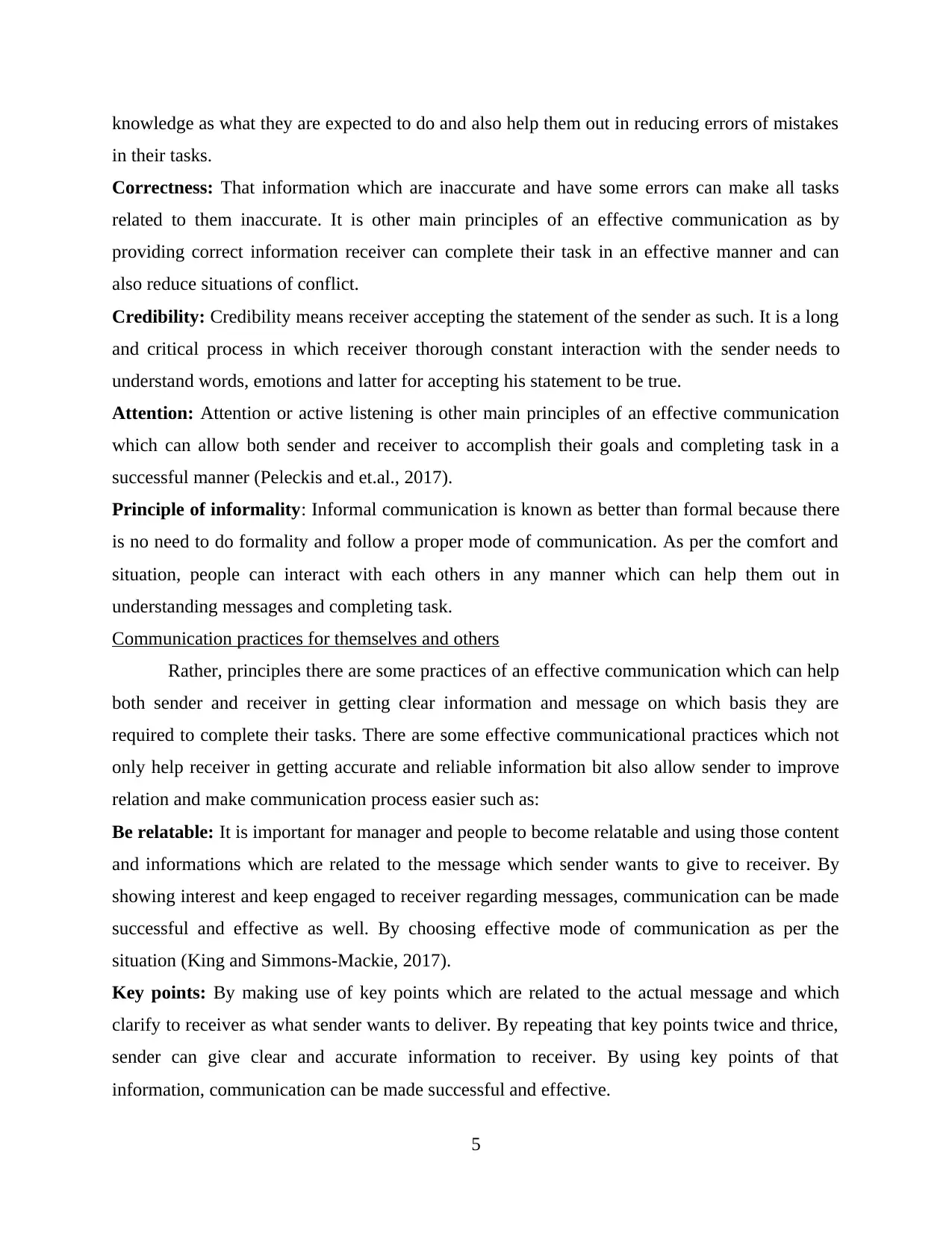
knowledge as what they are expected to do and also help them out in reducing errors of mistakes
in their tasks.
Correctness: That information which are inaccurate and have some errors can make all tasks
related to them inaccurate. It is other main principles of an effective communication as by
providing correct information receiver can complete their task in an effective manner and can
also reduce situations of conflict.
Credibility: Credibility means receiver accepting the statement of the sender as such. It is a long
and critical process in which receiver thorough constant interaction with the sender needs to
understand words, emotions and latter for accepting his statement to be true.
Attention: Attention or active listening is other main principles of an effective communication
which can allow both sender and receiver to accomplish their goals and completing task in a
successful manner (Peleckis and et.al., 2017).
Principle of informality: Informal communication is known as better than formal because there
is no need to do formality and follow a proper mode of communication. As per the comfort and
situation, people can interact with each others in any manner which can help them out in
understanding messages and completing task.
Communication practices for themselves and others
Rather, principles there are some practices of an effective communication which can help
both sender and receiver in getting clear information and message on which basis they are
required to complete their tasks. There are some effective communicational practices which not
only help receiver in getting accurate and reliable information bit also allow sender to improve
relation and make communication process easier such as:
Be relatable: It is important for manager and people to become relatable and using those content
and informations which are related to the message which sender wants to give to receiver. By
showing interest and keep engaged to receiver regarding messages, communication can be made
successful and effective as well. By choosing effective mode of communication as per the
situation (King and Simmons-Mackie, 2017).
Key points: By making use of key points which are related to the actual message and which
clarify to receiver as what sender wants to deliver. By repeating that key points twice and thrice,
sender can give clear and accurate information to receiver. By using key points of that
information, communication can be made successful and effective.
5
in their tasks.
Correctness: That information which are inaccurate and have some errors can make all tasks
related to them inaccurate. It is other main principles of an effective communication as by
providing correct information receiver can complete their task in an effective manner and can
also reduce situations of conflict.
Credibility: Credibility means receiver accepting the statement of the sender as such. It is a long
and critical process in which receiver thorough constant interaction with the sender needs to
understand words, emotions and latter for accepting his statement to be true.
Attention: Attention or active listening is other main principles of an effective communication
which can allow both sender and receiver to accomplish their goals and completing task in a
successful manner (Peleckis and et.al., 2017).
Principle of informality: Informal communication is known as better than formal because there
is no need to do formality and follow a proper mode of communication. As per the comfort and
situation, people can interact with each others in any manner which can help them out in
understanding messages and completing task.
Communication practices for themselves and others
Rather, principles there are some practices of an effective communication which can help
both sender and receiver in getting clear information and message on which basis they are
required to complete their tasks. There are some effective communicational practices which not
only help receiver in getting accurate and reliable information bit also allow sender to improve
relation and make communication process easier such as:
Be relatable: It is important for manager and people to become relatable and using those content
and informations which are related to the message which sender wants to give to receiver. By
showing interest and keep engaged to receiver regarding messages, communication can be made
successful and effective as well. By choosing effective mode of communication as per the
situation (King and Simmons-Mackie, 2017).
Key points: By making use of key points which are related to the actual message and which
clarify to receiver as what sender wants to deliver. By repeating that key points twice and thrice,
sender can give clear and accurate information to receiver. By using key points of that
information, communication can be made successful and effective.
5
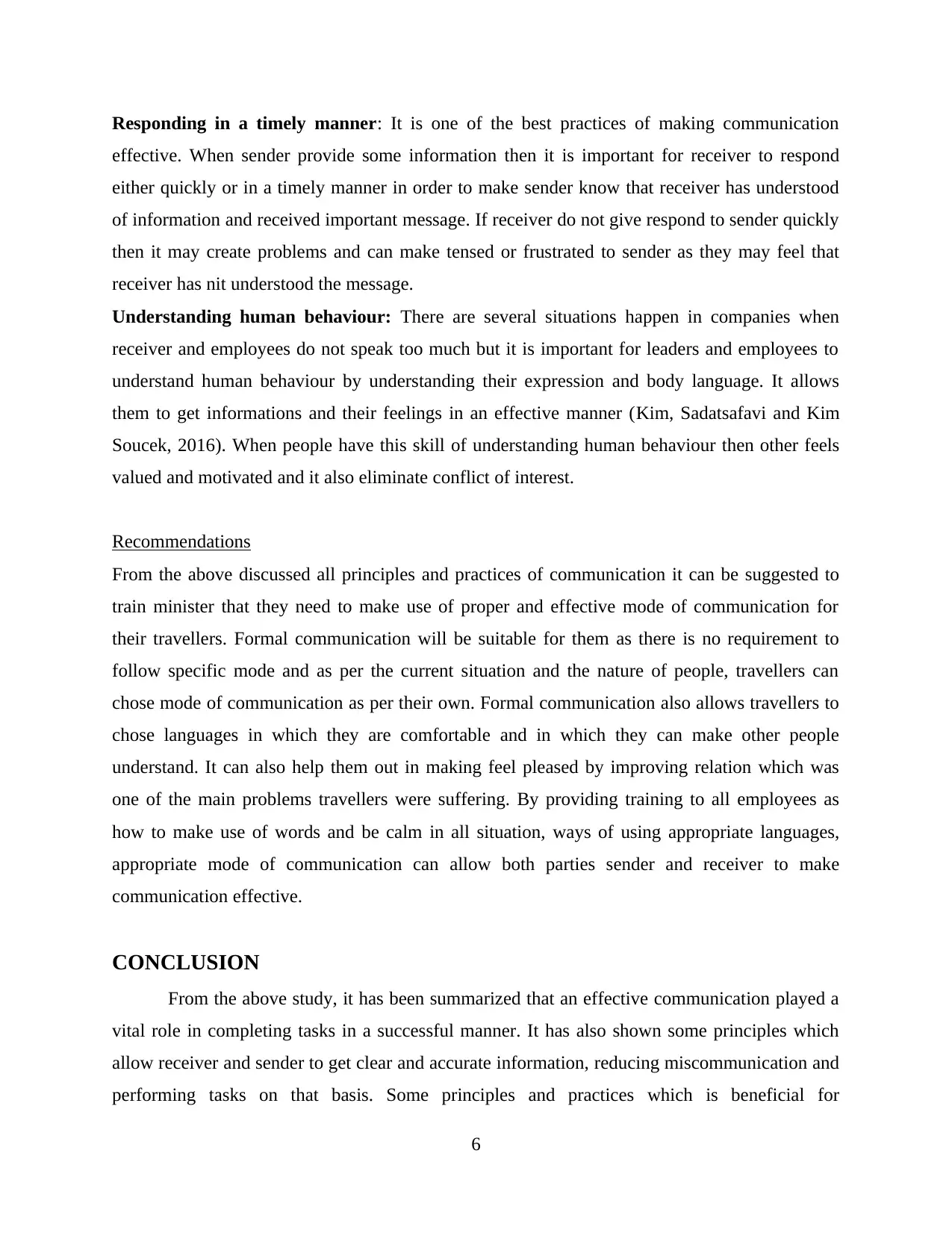
Responding in a timely manner: It is one of the best practices of making communication
effective. When sender provide some information then it is important for receiver to respond
either quickly or in a timely manner in order to make sender know that receiver has understood
of information and received important message. If receiver do not give respond to sender quickly
then it may create problems and can make tensed or frustrated to sender as they may feel that
receiver has nit understood the message.
Understanding human behaviour: There are several situations happen in companies when
receiver and employees do not speak too much but it is important for leaders and employees to
understand human behaviour by understanding their expression and body language. It allows
them to get informations and their feelings in an effective manner (Kim, Sadatsafavi and Kim
Soucek, 2016). When people have this skill of understanding human behaviour then other feels
valued and motivated and it also eliminate conflict of interest.
Recommendations
From the above discussed all principles and practices of communication it can be suggested to
train minister that they need to make use of proper and effective mode of communication for
their travellers. Formal communication will be suitable for them as there is no requirement to
follow specific mode and as per the current situation and the nature of people, travellers can
chose mode of communication as per their own. Formal communication also allows travellers to
chose languages in which they are comfortable and in which they can make other people
understand. It can also help them out in making feel pleased by improving relation which was
one of the main problems travellers were suffering. By providing training to all employees as
how to make use of words and be calm in all situation, ways of using appropriate languages,
appropriate mode of communication can allow both parties sender and receiver to make
communication effective.
CONCLUSION
From the above study, it has been summarized that an effective communication played a
vital role in completing tasks in a successful manner. It has also shown some principles which
allow receiver and sender to get clear and accurate information, reducing miscommunication and
performing tasks on that basis. Some principles and practices which is beneficial for
6
effective. When sender provide some information then it is important for receiver to respond
either quickly or in a timely manner in order to make sender know that receiver has understood
of information and received important message. If receiver do not give respond to sender quickly
then it may create problems and can make tensed or frustrated to sender as they may feel that
receiver has nit understood the message.
Understanding human behaviour: There are several situations happen in companies when
receiver and employees do not speak too much but it is important for leaders and employees to
understand human behaviour by understanding their expression and body language. It allows
them to get informations and their feelings in an effective manner (Kim, Sadatsafavi and Kim
Soucek, 2016). When people have this skill of understanding human behaviour then other feels
valued and motivated and it also eliminate conflict of interest.
Recommendations
From the above discussed all principles and practices of communication it can be suggested to
train minister that they need to make use of proper and effective mode of communication for
their travellers. Formal communication will be suitable for them as there is no requirement to
follow specific mode and as per the current situation and the nature of people, travellers can
chose mode of communication as per their own. Formal communication also allows travellers to
chose languages in which they are comfortable and in which they can make other people
understand. It can also help them out in making feel pleased by improving relation which was
one of the main problems travellers were suffering. By providing training to all employees as
how to make use of words and be calm in all situation, ways of using appropriate languages,
appropriate mode of communication can allow both parties sender and receiver to make
communication effective.
CONCLUSION
From the above study, it has been summarized that an effective communication played a
vital role in completing tasks in a successful manner. It has also shown some principles which
allow receiver and sender to get clear and accurate information, reducing miscommunication and
performing tasks on that basis. Some principles and practices which is beneficial for
6
⊘ This is a preview!⊘
Do you want full access?
Subscribe today to unlock all pages.

Trusted by 1+ million students worldwide
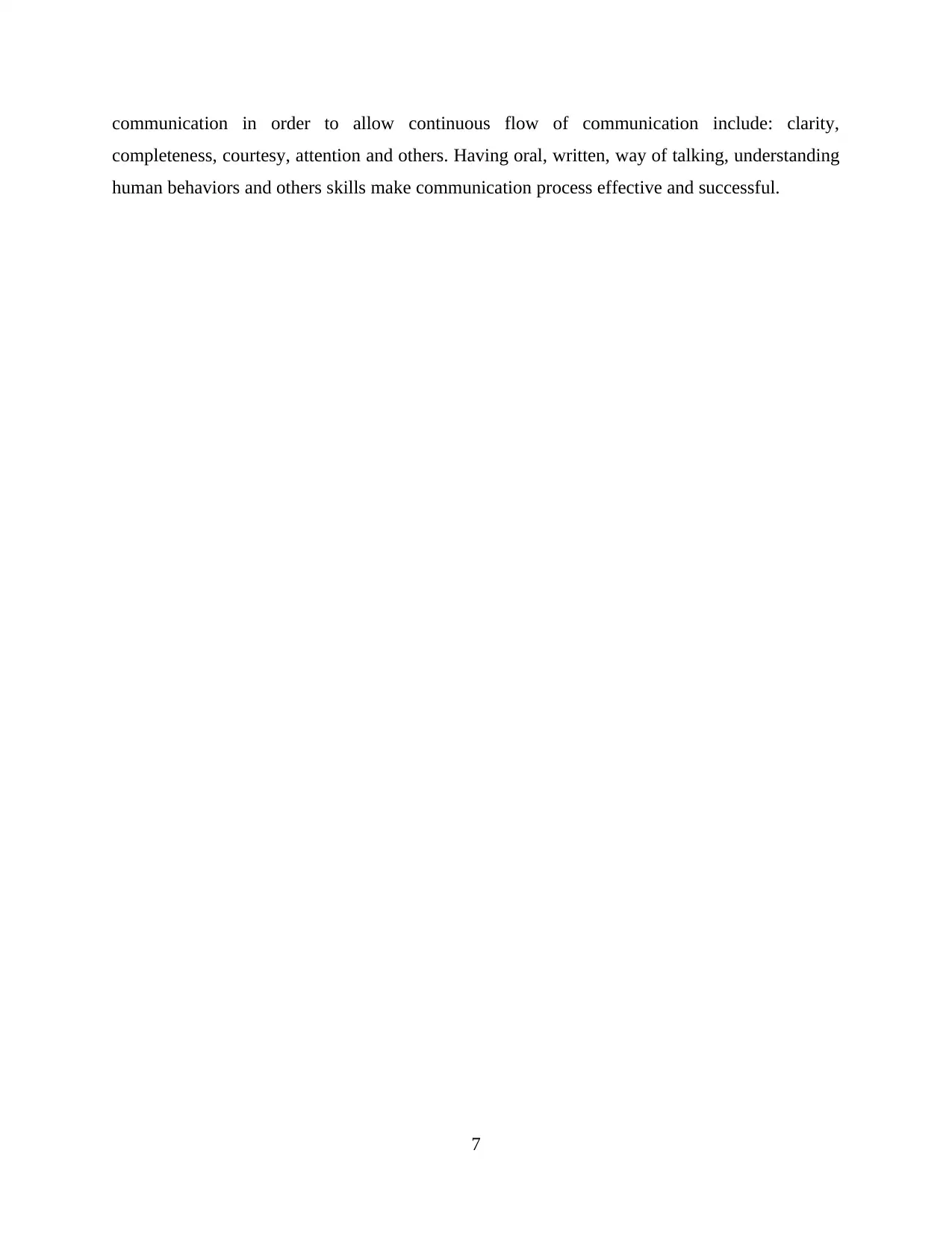
communication in order to allow continuous flow of communication include: clarity,
completeness, courtesy, attention and others. Having oral, written, way of talking, understanding
human behaviors and others skills make communication process effective and successful.
7
completeness, courtesy, attention and others. Having oral, written, way of talking, understanding
human behaviors and others skills make communication process effective and successful.
7
Paraphrase This Document
Need a fresh take? Get an instant paraphrase of this document with our AI Paraphraser
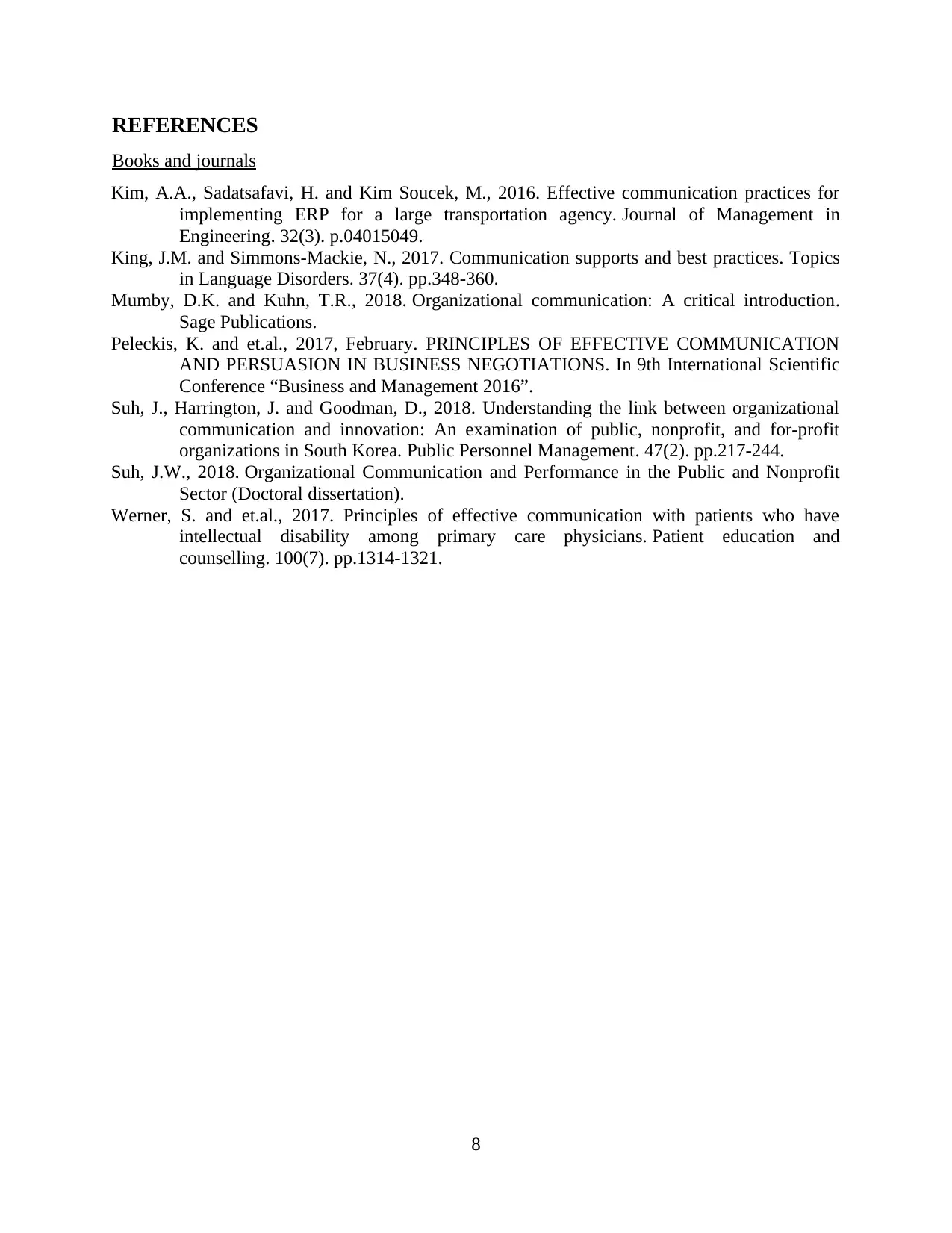
REFERENCES
Books and journals
Kim, A.A., Sadatsafavi, H. and Kim Soucek, M., 2016. Effective communication practices for
implementing ERP for a large transportation agency. Journal of Management in
Engineering. 32(3). p.04015049.
King, J.M. and Simmons-Mackie, N., 2017. Communication supports and best practices. Topics
in Language Disorders. 37(4). pp.348-360.
Mumby, D.K. and Kuhn, T.R., 2018. Organizational communication: A critical introduction.
Sage Publications.
Peleckis, K. and et.al., 2017, February. PRINCIPLES OF EFFECTIVE COMMUNICATION
AND PERSUASION IN BUSINESS NEGOTIATIONS. In 9th International Scientific
Conference “Business and Management 2016”.
Suh, J., Harrington, J. and Goodman, D., 2018. Understanding the link between organizational
communication and innovation: An examination of public, nonprofit, and for-profit
organizations in South Korea. Public Personnel Management. 47(2). pp.217-244.
Suh, J.W., 2018. Organizational Communication and Performance in the Public and Nonprofit
Sector (Doctoral dissertation).
Werner, S. and et.al., 2017. Principles of effective communication with patients who have
intellectual disability among primary care physicians. Patient education and
counselling. 100(7). pp.1314-1321.
8
Books and journals
Kim, A.A., Sadatsafavi, H. and Kim Soucek, M., 2016. Effective communication practices for
implementing ERP for a large transportation agency. Journal of Management in
Engineering. 32(3). p.04015049.
King, J.M. and Simmons-Mackie, N., 2017. Communication supports and best practices. Topics
in Language Disorders. 37(4). pp.348-360.
Mumby, D.K. and Kuhn, T.R., 2018. Organizational communication: A critical introduction.
Sage Publications.
Peleckis, K. and et.al., 2017, February. PRINCIPLES OF EFFECTIVE COMMUNICATION
AND PERSUASION IN BUSINESS NEGOTIATIONS. In 9th International Scientific
Conference “Business and Management 2016”.
Suh, J., Harrington, J. and Goodman, D., 2018. Understanding the link between organizational
communication and innovation: An examination of public, nonprofit, and for-profit
organizations in South Korea. Public Personnel Management. 47(2). pp.217-244.
Suh, J.W., 2018. Organizational Communication and Performance in the Public and Nonprofit
Sector (Doctoral dissertation).
Werner, S. and et.al., 2017. Principles of effective communication with patients who have
intellectual disability among primary care physicians. Patient education and
counselling. 100(7). pp.1314-1321.
8

9
⊘ This is a preview!⊘
Do you want full access?
Subscribe today to unlock all pages.

Trusted by 1+ million students worldwide

10
1 out of 10
Related Documents
Your All-in-One AI-Powered Toolkit for Academic Success.
+13062052269
info@desklib.com
Available 24*7 on WhatsApp / Email
![[object Object]](/_next/static/media/star-bottom.7253800d.svg)
Unlock your academic potential
Copyright © 2020–2026 A2Z Services. All Rights Reserved. Developed and managed by ZUCOL.




